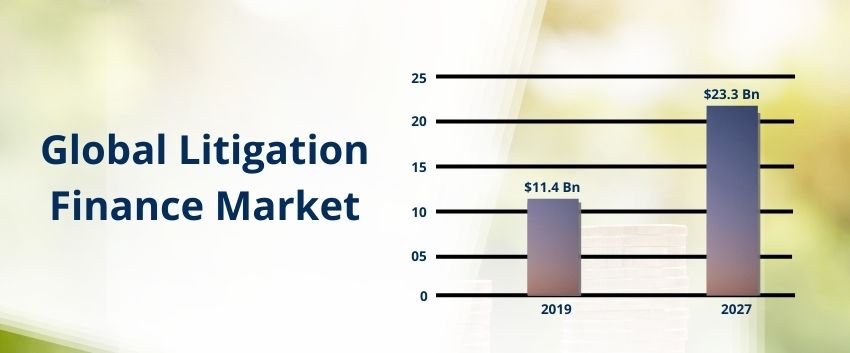
Litigation finance is a rapidly growing industry that provides funding to plaintiffs in exchange for a portion of their potential settlement or jury award. When deciding whether or not to provide funding, litigation finance companies must accurately value the case in order to assess the risk involved and determine a reasonable return on investment.
Litigation Finance Investment Market to grow $11.4 bn in 2019 to more than double to $23.3 bn in 2027, as per the study conducted by Kenilworth Global Fin Advisors’ research team that has constantly been tracking the market. An increase in the number of litigation cases as well as an increase in the average deal value will propel the growth through 2027.

An accurate valuation is critical because it allows the litigation finance company to price the risk involved in funding a particular case properly. If a case is undervalued, the company may take on too much risk and lose money if the plaintiff does not ultimately prevail. Conversely, if a case is overvalued, the company may miss out on potential profits by not providing enough funding.
Many factors go into valuing a case, including the strength of the legal claim, the expected amount of damages, the likelihood of success, and the costs of litigation. Litigation finance companies typically use a combination of public records, expert analysis, and their own experience to value cases.
The importance of accurate valuation was highlighted in a recent case involving a $2 million funding agreement between a plaintiff and a litigation finance company. The company agreed to provide funding in exchange for 40% of any recovery up to $10 million.
However, the case was ultimately settled for only $1 million, meaning that the company only recouped $400,000 of its investment. The company sued the plaintiff, alleging that she had misrepresented the value of her case.
The court ultimately sided with the plaintiff, finding that the company had failed to properly value the case before agreeing to provide funding. This case highlights the importance of accurate valuation in litigation finance. Without it, companies may be taking on too much risk and could end up losing money.
In litigation finance, accurate valuation is required in order to ensure that the investment provides an adequate return on investment. If the valuation is too low, the funder may lose money on the deal. If the valuation is too high, the funder may overpay for the investment and end up with a lower return.
There are several different methods that can be used to value a litigation finance investment. The most common method is to use a discounted cash flow analysis. This method considers the expected future cash flows from the investment and discounts them back to present value.
Other methods that can be used to value a litigation finance investment include the use of market comparisons and the application of a risk premium.
Market comparisons can be used to value investment by looking at similar investments that have been made in the past. The risk premium is a percentage that is added to the expected return on investment to account for the riskiness of the investment.
Litigation finance is a complex and specialized field. An accurate valuation is essential to ensure that the investment provides an adequate return on investment.
If you are a litigation finance firm needing an accurate financial valuation of a case, our experts can help you. Reach out to us at John@kgfinadvisors.com







